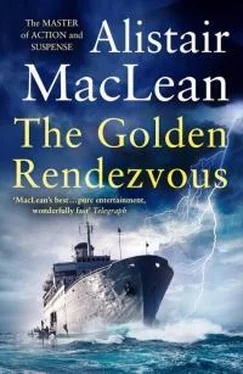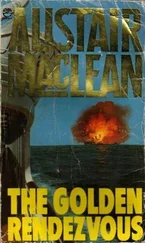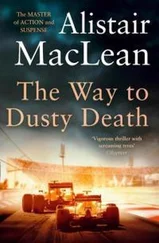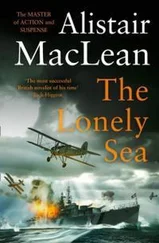“Your father leaves nothing to chance,” I admitted. “Except that he seems to be depending on me as the expert navigator on this ship.”
“He didn’t know – we weren’t to know – that all the other deck officers on the Campari were going to be – ah – so foolish. We – both my father and I – dislike killing of any kind.” Again the unmistakable ring of sincerity, but I was beginning to wonder if the bell hadn’t a crack in it. “My father is also a competent navigator, but, unfortunately, he has his hands very full at the moment. He happens to be the only professional seaman we have.”
“Your other men aren’t?”
“Alas, no. But they are perfectly adequate to the task of seeing that professional seamen – your men – do their duties as they should.”
This was cheering news. If Carreras persisted in pushing the Campari through the storm at this rate, practically everyone who wasn’t a professional seaman was going to be feeling very ill indeed. That might help to ease my night’s labours.
I said: “What’s going to happen to us after you’ve hijacked this damn’ bullion?”
“Dump you all on the Ticonderoga ,” he said lazily. “What else?”
“Yes?” I sneered. “So that we can straightaway notify every ship that the Campari had–”
“Notify whoever you like,” he said placidly. “Think we’re crazy? We’re abandoning the Campari the same morning: another vessel is already standing by. Miguel Carreras does think of everything.”
I said nothing and turned my attention to the charts while Susan made her request to be allowed to bring blankets. He smilingly said he would accompany her and they left together. When they returned in five minutes’ time I had entered in the course positions on the chart and found that the Fort Ticonderoga was really on course. I handed the chart to Carreras with that information: he thanked me and left.
Dinner came at eight o’clock. It wasn’t much of a meal as Campari dinners went, Antoine was never at his best when the elements were against him, but it was fair enough for all that. Susan ate nothing; I suspected she had been sick more than once, but had made no mention of it: millionaire’s daughter or not, she was no cry-baby and had no self-pity, which was only what I would have expected from the daughter of the Beresfords. I wasn’t hungry myself, there was a knot in my stomach that had nothing to do with the motion of the Campari , but again on the principle that I was going to need all the strength I could find, I made a good meal. MacDonald ate as if he hadn’t seen food for a week. Bullen still slept under sedation, restless against the securing straps that held him to his bed, breathing still distressed, mumbling away continually to himself.
At nine o’clock Marston said: “Time now for coffee, John?”
“Time for coffee,” I agreed. Marston’s hands, I noticed, weren’t quite steady. After too many years of consuming the better part of a bottle of rum every night, his nerves weren’t in any too fit a condition for this sort of thing.
Susan brought in five cups of coffee, one at a time – the wild pitching of the Campari , the jarring, jolting shocks as we crashed down into the troughs, made the carrying of more than one at a time impossible. One for herself, one for MacDonald, one for Marston, one for me – and one for the sentry, the same youngster as had been on guard the previous night. For the four of us, sugar: for the sentry, a spoonful of white powder from Marston’s dispensary. Susan took his cup outside.
“How’s our friend?” I asked when she returned.
“Almost as green as I am.” She tried to smile but it didn’t come off. “Seemed glad to get it.”
“Where is he?”
“In the passage. Sitting on the floor, jammed in a corner, gun across his knees.”
“How long before that stuff acts, Doctor?”
“If he drinks it straightaway, maybe twenty minutes. And don’t ask me how long the effects will last. People vary so much that I’ve no idea. Maybe half an hour, maybe three hours. You can never be certain with those things.”
“You’ve done all you can. Except the last thing. Take off those outside bandages and those damned splints, will you?”
He looked nervously at the door. “If someone comes–”
“We’ve been all through that,” I said impatiently. “Even by taking a chance and losing, we’ll be no worse off than we were before. Take them off.”
Marston fetched a chair to give himself steadier support, sat down, eased the point of his scissors under the bandages holding the splints in place and sliced through them with half a dozen swift clean cuts. The bandages fell away, the splints came loose and the door opened. Half a dozen long strides and Tony Carreras was by my bedside, staring down thoughtfully. He looked even paler than the last time I’d seen him.
“The good healer on the night shift, eh? Having a little patient trouble, Doctor?”
“Trouble?” I said hoarsely. I’d my eyes screwed half shut, lips compressed, fists lying on the coverlet tightly clenched. Carter in agony. I hoped wasn’t overdoing it. “Is your father mad, Carreras?” I closed my eyes completely and stifled – nearly – a moan as the Campari lurched forward and down into an abnormally deep trough with a shuddering, jarring impact that all but threw Carreras off his feet. Even through closed doors, even above the eldritch howl of the wind and the lash of the gale-driven rain, the sound of the impact was like gunfire, and not distant gunfire at that. “Does he want to kill us all? Why in God’s name can’t he slow down?”
“Mr. Carter is in very great pain,” Doc Marston said quietly. Whatever his faults as a doctor, he was fast at catching on, and when you looked into those steady wise blue eyes beneath the magnificent mane of white hair, it was impossible not to believe him. “Agony would be a better word. He has, as you know, a compound fracture of the femur.” With delicate fingers he touched the bloodstained bandages that had been concealed by the splints so that Carreras could see just how compound it was. “Every time the ship moves violently, the broken ends of the bone grind together. You can imagine what it’s like – no, I doubt if you can. I am trying to rearrange and tighten the splints so as to immobilise the leg completely. Difficult job for one man in those conditions. Care to give me a hand?”
In one second flat I revised my estimate of Marston’s shrewdness. No doubt he’d just been trying to allay any suspicions that Carreras might have had but he couldn’t have thought up a worse way. Not, that is, if Carreras offered his help, for the chances were that if he did delay to help he’d find the sentry snoring in the passageway outside when he left.
“Sorry.” Beethoven never sounded half as sweet as the music of that single word from Carreras. “Can’t wait. Captain Carreras making his rounds and all that. That’s what Miss Beresford is here for anyway. Failing all else, just shoot him full of morphia.” Five seconds later he was gone.
Marston raised an eyebrow.
“Less affable than of yore, John, you would say. A shade lacking in sympathy he so often professes?”
“He’s worried,” I said. “He’s also a little frightened and perhaps, heaven be praised, even more than a little sea-sick. But still very tough for all that. Susan, go collect the sentry’s cup and see if friend Carreras has really gone.”
She was back in fifteen seconds.
“He’s gone. The coast is clear.”
I swung my legs over the side of the bed and stood up. A moment later I had fallen heavily to the floor, my head just missing the iron foot of MacDonald’s bed. Four things were responsible for this: the sudden lurch of the deck as the Campari had fallen into a trough, the stiffness of both legs, the seeming paralysis of my left leg and the pain that had gone through my thigh like a flame as soon as my foot had touched the deck.
Читать дальше












